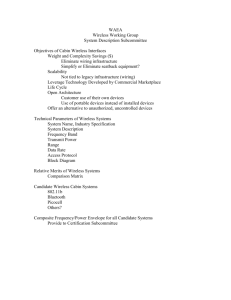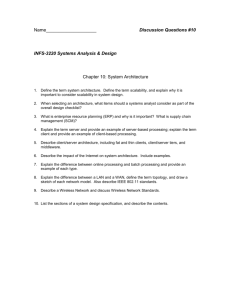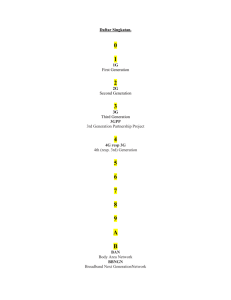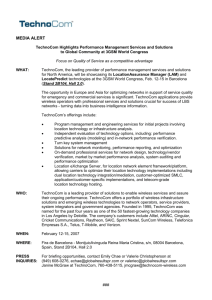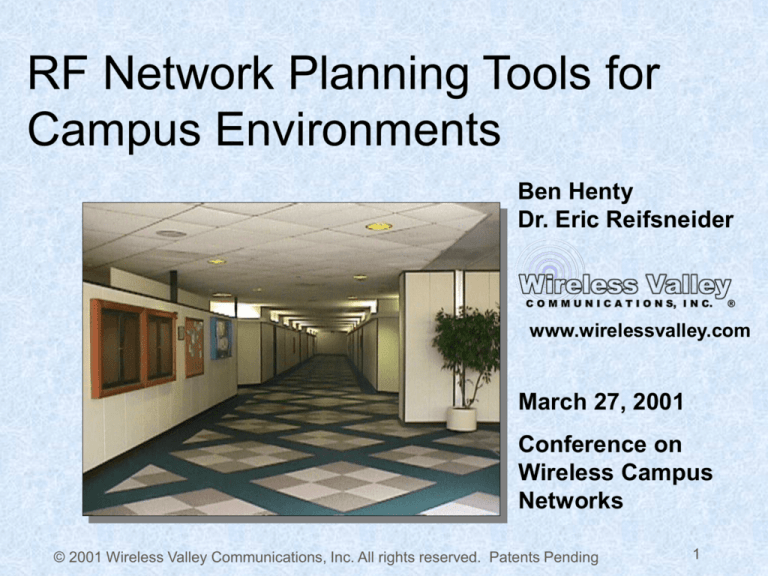
RF Network Planning Tools for
Campus Environments
Ben Henty
Dr. Eric Reifsneider
www.wirelessvalley.com
March 27, 2001
Conference on
Wireless Campus
Networks
© 2001 Wireless Valley Communications, Inc. All rights reserved. Patents Pending
1
Planning Tool History:
Macrocell Design
• Original use of planning tools was outdoor
cellular networks
• Planning tools became widely accepted
• Planning decisions could be simulated and
analyzed prior to deployment
• Design strategies and techniques
improved
• Cell tower designs became more efficient
2
© 2001 Wireless Valley Communications, Inc. All rights reserved. Patents Pending
Wireless Access Issues on Campus
• Campuses and large enterprises need
planned wireless internet and cellular/PCS
strategy
• Campus environments require ongoing
facilities management and present unique
wireless planning challenges
• In-building wireless deployment in its
infancy but will explode with Wireless
Office, Wireless LANs, Wireless Video,
VoIP, Bluetooth, and Wireless PDAs.
3
© 2001 Wireless Valley Communications, Inc. All rights reserved. Patents Pending
Why Campus/Indoor Wireless
Access Points?
• Shared classrooms and public areas need
coverage
• Universities have highly mobile pool of
techno-savvy users
• Coverage and capacity demands of current
wireless users
• Customers need and want indoor service
• Cost savings through integrated services
and billing
4
© 2001 Wireless Valley Communications, Inc. All rights reserved. Patents Pending
Service Types
•
•
•
•
Cellular/PCS/WAP
Wireless Office Service
Wireless LAN (IEEE 802.11)
Wireless PDAs (Compaq
IPAQ, Handspring)
• Wireless VoIP
• Wireless Video
• Bluetooth
5
© 2001 Wireless Valley Communications, Inc. All rights reserved. Patents Pending
Why use an RF Planning Tool?
• Efficient system design while minimizing costs
and providing coverage and capacity needs
• Indoor wireless prediction is non-intuitive and
complex, but huge cost savings are possible
• Planning tools allow flexibility and rapid “what if”
designs to meet building-specific needs
• Easy visualization of side-by-side comparisons
between competing or proposed systems/bids
• SitePlanner also allows simultaneous integration
of wireless equipment tracking and asset
management
6
© 2001 Wireless Valley Communications, Inc. All rights reserved. Patents Pending
The SitePlanner® Design Environment
Optimatic®
optimize 3-D
wireless designs
using field
measurements
InFielder®
ultra-portable
3-D site-specific
measurements
Predictor™
3-D site-specific
design, prediction,
asset management
BDM™
3-D site modeling
and archiving
environment
7
© 2001 Wireless Valley Communications, Inc. All rights reserved. Patents Pending
SitePlanner 2000 and Add-On Modules Work Together
SitePlanner ®
LANFielder™
3-D site-specific 802.11b
WLAN measurement
InFielder
Predictor™
®
Optimatic®
BDM ™
SiteSpy™
802.11b WLAN
measurement,
traffic generation
GPS Drive-Test
Option for WaveSpy
WaveSpyTM
PalmFielder™
Lightweight portable fast
scanning receiver for all
digital and analog wireless
standards
ultra-portable 3-D site-specific
measurement, asset management, and
visualization of network performance
on the Palm IIICTM
8
© 2001 Wireless Valley Communications, Inc. All rights reserved. Patents Pending
SitePlanner® Graphical System Design
Fiber Remote
Leaky Feeder
Antenna
Components are drawn from a
customizable Parts List Library
consisting of more than 3,000
components from over three
dozen manufacturers
Point and click with the mouse to visually position wireless system
components such as cables, antennas, amplifiers, splitters, and many more!
9
© 2000 Wireless
Valley
Communications,
Inc.
Allreserved.
rights Patents
reserved.
© 2001 Wireless
Valley
Communications, Inc. All
rights
PendingPatents Pending
SitePlanner® Built-in Components Database
Parts List Library contains thousands of antennas,
amplifiers, cables, splitters, and leaky feeder antennas
Quickly and easily analyze design tradeoffs in terms of
cost and performance with the click of the mouse
10
© 2001 Wireless Valley Communications, Inc. All rights reserved. Patents Pending
SitePlanner® Instant Point
Predictions
Simply move the mouse cursor
and watch in real-time as the
composite system coverage is
updated and displayed at that
point instantly!
11
© 2001 Wireless Valley Communications, Inc. All rights reserved. Patents Pending
SitePlanner ® Instant Antenna Positioning
Moving the mouse on the screen
corresponds to repositioning or
re-orienting a selected antenna.
The new coverage area of the
antenna is updated in real-time!
New antenna
position
Updated
coverage
region
12
© 2001 Wireless Valley Communications, Inc. All rights reserved. Patents Pending
SitePlanner® Wireless System Layout
Shows antenna system component interconnections graphically
13
© 2001 Wireless Valley Communications, Inc. All rights reserved. Patents Pending
SitePlanner® Features and Benefits
• Facilitates rapid cost and performance tradeoff
analysis of all technologies at low overall cost
• Simultaneous site design, survey, verification, and
documentation with 3D graphical representation
• Automatic archiving of installed infrastructure
• Automatic bill of materials created during design
• Asset management facilities built in
• Cellular, PCS, 3G, WLAN, MMDS, and beyond
• Accurate and practical modeling of any campus
wireless system
14
© 2001 Wireless Valley Communications, Inc. All rights reserved. Patents Pending
RF Planning Objectives
• Satisfaction of Specific Customer Needs
• RF and Network Performance (Coverage
and Capacity)
• Minimal Cost (Equipment and Installation)
• Cooperation with macrocell systems and
interference minimization
• Ease of installation and integration
• Ongoing infrastructure maintenance
15
© 2001 Wireless Valley Communications, Inc. All rights reserved. Patents Pending
RF Planning Obstacles
• Meeting cost criteria
• Sufficient received signal power (enough,
but not too much interference)
• Sufficient capacity to meet user demand
• Signal leakage: only where desired
• Meeting quality of service requirements
• RF Safety concerns (Meeting FCC
regulations for indoor measurement)
16
© 2001 Wireless Valley Communications, Inc. All rights reserved. Patents Pending
Typical Design Steps
• Comparison of RF System Technologies
• Use SitePlanner to simulate RF performance of
several straw-man designs in facility of interest
• In-situ site survey and measurement with
SitePlanner, including throughput or signal
strength with transmitter locations from most
promising straw-man design
• Use SitePlanner field measurements to optimize
network performance and select final layout
• System Installation and Verification
• Regular Maintenance and Design Archiving
17
© 2001 Wireless Valley Communications, Inc. All rights reserved. Patents Pending
Wireless LAN Planning:
TM
TM
LANFielder and SiteSpy
Measurement
results that you
can understand
without being
an RF Engineer
Provides wireless data
network measurement
using client/server
technique
18
© 2001 Wireless Valley Communications, Inc. All rights reserved. Patents Pending
Case Study: WLAN Design
• 100,000 sq. ft., multi-story academic
building on the University of Virginia Tech
campus
• Technology:
– IEEE 802.11b, 2.4 GHz DSSS
– 11 Mbps Cabletron RoamAbout access
points and modems (Lucent/ORiNOCO OEM)
19
© 2001 Wireless Valley Communications, Inc. All rights reserved. Patents Pending
WLAN Design: 3D Model
10 minutes from CAD file
to SitePlanner model
20
© 2001 Wireless Valley Communications, Inc. All rights reserved. Patents Pending
WLAN Design: Predicted Performance
<60 seconds
on PII 300
Predicted signal strength for 3
Wireless LAN Access Points
21
© 2001 Wireless Valley Communications, Inc. All rights reserved. Patents Pending
Visualizing WLAN Measurements
Required < 1 minute on a Pentium II 300 MHz PC
22
© 2001 Wireless Valley Communications, Inc. All rights reserved. Patents Pending
Conclusions: WLAN Design
• Rapid predictions enabled analysis of 3 completely
different system configurations accompanied by
VA Tech CNS engineers
• 3D modeling enabled designer to leverage crossfloor coverage of signal
• Enabled accurate outdoor coverage estimates
• Verification measurements validated predictions to
within 3 feet
• Complete design (12 access points)
required only an hour and was performed
interactively
23
© 2001 Wireless Valley Communications, Inc. All rights reserved. Patents Pending
Conclusions: WLAN Design
• Significant time savings on overall design and
deployment
– Verification confirmed an accuracy within 5 dB standard
deviation (predicted vs. measured)
– Rapid predictions enabled numerous design tradeoffs
to be analyzed
• Greater RF designer satisfaction
– Designer can “see” performance
• Greater building owner satisfaction
– Building owner can “see” performance
• Automatic design archiving a key benefit
24
© 2001 Wireless Valley Communications, Inc. All rights reserved. Patents Pending
Final Remarks
• RF Planning tools ease wireless system design
• allow intelligent design tradeoff and
• competitive system analysis and comparisons
• SitePlanner offers a revolutionary design
environment that supports visual and textual
records required for common procedures, shared
strategies, and archiving for any wireless system
• SitePlanner facilitates cost and time savings for
rapid deployment and ongoing maintenance for any
in-building or campus system
• Come visit our booth for more information about
SitePlanner and LANFielder
25
© 2001 Wireless Valley Communications, Inc. All rights reserved. Patents Pending

